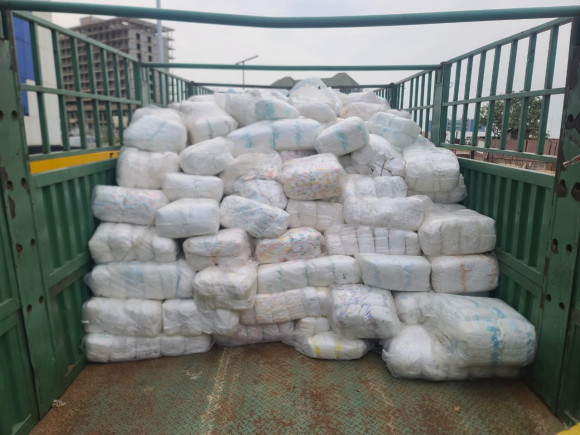The Consumer Arbitration and Mediation Centre (CAMC) has raised concerns over the continued sale of banned baby diapers in Ghana, warning that the products pose serious health risks to infants.
This follows recent action by the Food and Drugs Authority (FDA), which seized and destroyed over one million pieces of contaminated diapers across various parts of the country.
Speaking on Citi FM on Wednesday, May 28, 2025, the Executive Director of CAMC, Mr Nana Prempeh Okogyeabour Aduhene, stated that the diapers—mostly imported from China—had failed safety checks in their countries of origin.
He explained that the products were originally marked for destruction but ended up on the Ghanaian market after being repackaged under unhygienic conditions.
“These diapers are rejected products meant for disposal. But because of greed, some importers collect them from refuse dumps, wrap them in plain polythene bags, and sell them in our markets,” Mr Aduhene said.
“When we tested samples from Accra, Kasoa, and other locations, we found high levels of microbial contamination.”
According to Mr Aduhene, CAMC began investigations in June 2024 following numerous complaints from mothers whose babies had developed severe rashes and infections.
The Centre collected and tested various diaper brands, several of which were found to be unsafe. It subsequently alerted the FDA, which conducted its own inspections and shut down repackaging sites operating in unsanitary conditions.
“Our work is not to replace what the FDA does. But when we found the evidence, we did not keep it to ourselves. The FDA acted on it and shut down the places where these products were being handled,” Mr Aduhene added.
The CAMC’s findings echo earlier concerns raised by the Consumer Protection Agency (CPA), which had conducted similar tests in Greater Accra, Kumasi, Tamale, Sunyani, and Sefwi Wiawso.
The CPA confirmed that many of the substandard diapers had been smuggled into Ghana after being rejected abroad. Most lacked labels, batch numbers, or country-of-origin markings, making them nearly impossible to trace or recall.
The Executive Director of Mediation and Arbitration at the CPA, Mr Nana Aduhene, described the situation as alarming.
“Are the over five million babies and toddlers in Ghana not deserving of clean and safe diapers? Must our children suffer because some importers put profit ahead of their health?” he asked.
He also noted that although these diapers are unsafe, they are often sold at very low prices—sometimes two or three times cheaper than approved brands—making them attractive to unsuspecting parents.
In a related matter, Mr Aduhene revealed that CAMC had received reports of unlabelled paint products being falsely sold as “American paint”. In one case, he said, a child with asthma in Kumasi died after sleeping in a freshly painted room that contained dangerously high levels of lead.
Both CAMC and the CPA are calling for stricter monitoring at Ghana’s ports to prevent the entry of unsafe products. They have pledged to support the FDA in further investigations and public education campaigns to protect consumers.
The FDA has announced plans to extend its enforcement activities beyond Accra and Kasoa to other parts of the country. It is also undertaking community awareness exercises to warn the public about hazardous products on the market.
Parents are being urged to avoid unfamiliar or unlabelled diaper brands and to report any health concerns to the relevant health authorities.

